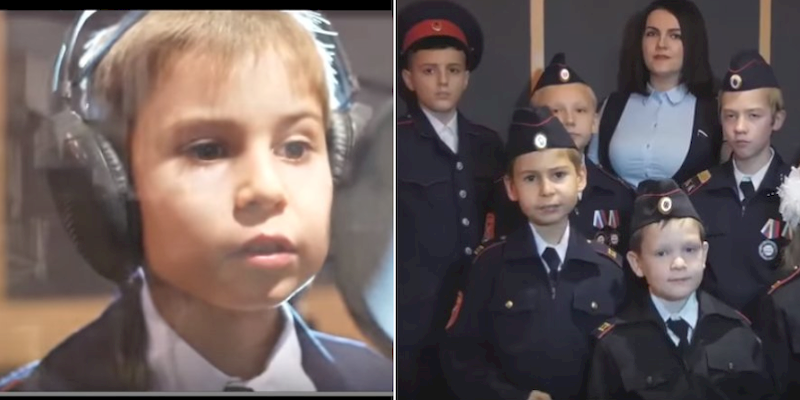Russian children sing of their readiness to die if called upon by Putin

A ruling party MP in Russia has produced a video clip in which children enthusiastically sing of their willingness to ‘fight the final battle” for ‘Uncle Vova’, otherwise known as President Vladimir Putin. They also promise not only to hold on to Crimea which Russia has illegally annexed, but also to reclaim Alaska. While seemingly the initiative of Anna Kuvychko, a new United Russia MP doubtless eager to demonstrate her loyalty, this is not the first such video where children in uniform are used for unadulterated propaganda.
The clip has Kuvychko singing together with young police cadets, some under 10, from School No. 44 in Volgograd. The words and music are by Viacheslav Antonov, who is apparently a taxi driver from the Moscow region. His rendition, together with his young son, also has the lad leaping in to tell ‘Uncle Vova, we’re with you”.
Kuvychko has embellished her clip with images from abroad, clearly intended to demonstrate the chaos reigning there, and the country ‘deprived of a President’. All of this is, of course, in contrast to the children singing together in the studio or against a background of historical sites, including Mamaev Kurgan and the memorial complex marking the pivotal Battle of Stalingrad during WWII.
The words in the refrain about the world being tired of wars, especially sung by children, are reminiscent of Soviet propaganda songs, like “Do Russians want war?” There is, however, a fundamental difference. In that Soviet song, the children were there to reflect childlike innocence, a world in which, as the small child sang, there should “always be the Sun, Mama and me”. Here the children sing that while peace would be good, “if the Chief Commander calls us to the last battle, we’re with you, Uncle Vova”. If the children themselves only dimly understand what that ‘last battle’ suggests, what about their parents?
Some of the words of this “patriotic composition” are positively menacing:
“Our Sevastopol and Crimea we will retain for our descendants,
And return Alaska to the hearth of the homeland”.
By no means all view this as disturbing. The report from the local publication bloknot-volgograd.ru, quoted under the video clip, is basically glowing.
“The text of the song talks about difficult diplomatic relations on the international arena in which Russia is proving unwavering and is determinedly upholding its own vector of development, despite pressure. Moreover, the children, inspired by the example of Crimea, hope for the reunification [sic] of other originally Russian territories. “Now they have other challenges before them, no less serious than before. But they will definitely cope and win,” Kuvychko asserts.”
As mentioned, this is not the first such video. On September 1, a little girl called Diana solemnly promised Alexander Bastrykin, head of the Investigative Committee that she would shop her mother if that were required by her work. Bastrykin responded by embracing her and kissing her hand, while young boys a little older than Diana promised that they would make sure that she joined the investigators’ ranks after leaving kindergarten (details here).
The Crimean Human Rights Group and others have long warned of the dangerous level of militarization in Crimea under Russian occupation, including the use of children. During official Russian festivities in Sevastopol on the third anniversary of annexation, there was a choreographed item in which girls sing: “My country, my fate, my dream, my war”. At that point, other children burst onto the stage waving mock machine guns around, with a culminating point seemingly the girls prancing about with Russian flags.
In another piece, young girls dance around Russia’s statue glorifying the invader, bleating “thank you” in unison (more details here).
It should be noted that Putin himself clearly has a taste for such demonstrations of adulation normally seen among totalitarian dictators. Children can be heard singing Putin’s praise in his presence here and while it is unclear how many online birthday greetings are real, the Russian media regularly produces sycophantic reports about Putin’s dog, skiing, fishing, etc.





